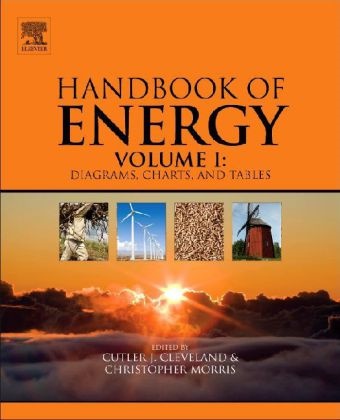Read more
Informationen zum Autor Cutler J. Cleveland is the Director of the Center for Energy and Environmental Studies at Boston University, where he also holds the position of Professor in the Department of Geography and Environment. Dr. Cleveland is Editor-in-Chief of the Encyclopedia of Energy (Elsevier Science, 2004), winner of an American Library Association award, Editor-in-Chief of the Dictionary of Energy (Elsevier Science, in press) and Editor-in-Chief of the journal Ecological Economics. Dr. Cleveland is a member of the American Statistical Association’s Committee on Energy Statistics, an advisory group to the Department of Energy, and a participant in the Stanford Energy Modeling Forum. He has been a consultant to numerous private and public organizations, including the Asian Development Bank, Charles River Associates, the Technical Research Centre of Finland, the U.S. Department of Energy, and the U.S. Environmental Protection Agency. The National Science Foundation, the National Aeronautics and Space Administration and the MacArthur Foundation have supported his research. Dr. Cleveland’s research focuses on the ecological-economic analysis of how energy and materials are used to meet human needs. His research employs the use of econometric models of oil supply, natural resource scarcity, and the relation between the use of energy and natural resources and economic systems. Dr. Cleveland publishes in journals such as Nature, Science, Ecological Modeling, Energy, The Energy Journal, The Annual Review of Energy, Resource and Energy Economics, the American Association of Petroleum Geologists Bulletin, the Canadian Journal of Forest Research, and Ecological Economics. He has won publication awards from the International Association of Energy Economics and the National Wildlife Federation. Christopher Morris is owner of Morris Books and a professional lexicographer who has edited more than 20 different dictionaries on a wide variety of subjects. He is editor in chief of the award-winning Academic Press Dictionary of Science and Technology, which provides the largest vocabulary of science yet compiled and features special essays by 120 eminent scientists, including nine Nobel laureates. He served as chief editor of the Macmillan school dictionary series, which includes several of the largest-selling educational dictionaries in U.S. history. He has also been an author of school and college textbooks and has compiled many different scientific glossaries, for fields such as ecology, endocrinology, microbiology, oncology, reproductive biology, and toxicology. He and Cutler Cleveland previously collaborated on the Encyclopedia of Energy, winner of an American Library Association award, for which Dr. Cleveland was editor in chief and he served as chief development editor. Klappentext The Handbook of Energy will provide a comprehensive, organized work of knowledge on all phases of energy and its role in society including the social, economic, political, historical, and environmental aspects. In addition, the handbook will cover energy-related physical science and engineering information. Inhaltsverzeichnis I. Sources Biomass, Hydropower, Wind, Coal, Oil, Natural Gas, Electricity, Nuclear, Alternatives, Renewables, Geothermal, Solar, Photovoltaic, Fuel Cells, Hydrogen, Ocean Energy II. Foundations Thermodynamics, Physics, Chemistry, Earth Science, Astronomy, Bioenergetics, Concepts, Measurement III. Applications Consumption; Conversion; Efficiency; Storage; Materials; Devices and Tools; Agriculture; Mining; Lighting; Manufactured Gas; HVAC; Refrigeration; Communication; Transportation, Land; Transportation, Water; Transportation, Air IV. Effects Environment, Ecology, Climate Change, Depletion and Shortages, Health and Safety, Wars and Conflicts, Transitions, Sustainable Development V. Correlations Economics, Business, Organizations, Policy, Social Issue...
List of contents
I. Sources
Biomass, Hydropower, Wind, Coal, Oil, Natural Gas, Electricity, Nuclear, Alternatives, Renewables, Geothermal, Solar, Photovoltaic, Fuel Cells, Hydrogen, Ocean Energy
II. Foundations
Thermodynamics, Physics, Chemistry, Earth Science, Astronomy, Bioenergetics, Concepts, Measurement
III. Applications
Consumption; Conversion; Efficiency; Storage; Materials; Devices and Tools; Agriculture; Mining; Lighting; Manufactured Gas; HVAC; Refrigeration; Communication; Transportation, Land; Transportation, Water; Transportation, Air
IV. Effects
Environment, Ecology, Climate Change, Depletion and Shortages, Health and Safety, Wars and Conflicts, Transitions, Sustainable Development
V. Correlations
Economics, Business, Organizations, Policy, Social Issues, Public Attitudes
Report
"Editors Cleveland and Morris offer this information-dense reference on human energy procurement and usage. Part I covers physiological energy needs and sources of energy including fossil fuels, traditional renewables, biomass, hydrogen, and fuel cells. Part II addresses the thermodynamics, chemistry, physics, geology, and measurement methods behind energy technology. Part III, applications, pertains to energy uses, including household electricity consumption." --ProtoView.com, February 2014
"This handbook.is a comprehensive resource on all aspects of energy.Volume 1, divided into five parts and 30 sections, is a compilation of more than 2,000 technical diagrams and easy-to-comprehend figures, charts, and tables that emphasize specific energy concepts.This authoritative resource will be valuable for audiences in disparate fields of interest. Summing Up: Highly Recommended." --CHOICE Reviews Online, March 2014

